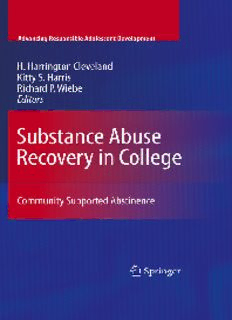
Substance Abuse Recovery in College: Community Supported Abstinence PDF
Preview Substance Abuse Recovery in College: Community Supported Abstinence
Advancing Responsible Adolescent Development SeriesEditor RogerJ.R.Levesque IndianaUniversity,Bloomington,IN,U.S.A. Forfurthervolumes: http://www.springer.com/series/7284 · · H. Harrington Cleveland Kitty S. Harris Richard P. Wiebe Editors Substance Abuse Recovery in College Community Supported Abstinence 123 Editors H.HarringtonCleveland KittyS.Harris DepartmentofHumanDevelopment& TexasTechUniversity FamilyStudies CenterfortheStudyofAddiction andRecovery PennsylvaniaStateUniversity LubbockTX79409 UniversityParkPA16802 Box41162 USA USA [email protected] [email protected] RichardP.Wiebe DepartmentofBehavioralSciences FitchburgStateCollege 160PearlStreet FitchburgMA01420 USA [email protected] ISBN978-1-4419-1766-9 e-ISBN978-1-4419-1767-6 DOI10.1007/978-1-4419-1767-6 SpringerNewYorkDordrechtHeidelbergLondon LibraryofCongressControlNumber:2010920306 ©SpringerScience+BusinessMedia,LLC2010 Allrightsreserved.Thisworkmaynotbetranslatedorcopiedinwholeorinpartwithoutthewritten permission of the publisher (Springer Science+Business Media, LLC, 233 Spring Street, New York, NY10013,USA),exceptforbriefexcerptsinconnectionwithreviewsorscholarlyanalysis.Usein connectionwithanyformofinformationstorageandretrieval,electronicadaptation,computersoftware, orbysimilarordissimilarmethodologynowknownorhereafterdevelopedisforbidden. Theuseinthispublicationoftradenames,trademarks,servicemarks,andsimilarterms,eveniftheyare notidentifiedassuch,isnottobetakenasanexpressionofopinionastowhetherornottheyaresubject toproprietaryrights. Printedonacid-freepaper SpringerispartofSpringerScience+BusinessMedia(www.springer.com) Preface Morethan80%ofcollegestudentsaredrinking.Morethanathirddodrugs.Forstu- dents struggling with substance abuse, temptations on campus—and stressors that canderailabstinence—runhigh.Inresponse,severalcollegesanduniversitiesoffer effective support in the form of recovery communities, which are more appropri- atetocampussettingsandyoungadultdevelopmentthantraditional12-stepgroups alone. SubstanceAbuseRecoveryinCollegeexplainsinauthoritativedetailwhatcolle- giaterecoverycommunitiesare,thetypesofservicestheyprovide,andtheirrolein the context of campus life, with extended examples from Texas Tech University’s influentialCSAR(CenterfortheStudyofAddictionandRecovery)program.Using data from both conventional surveys and end-of-day daily Palm Pilot assessments as well as focus groups, the book examines community members’ experiences. In addition,theimportanceofapositiverelationshipbetweentherecoverycommunity andtheschooladministrationisemphasized. Topicscoveredinclude: • Thegrowingneedforrecoveryservicesatcolleges. • Howrecoverycommunitiessupportabstinenceandrelapseprevention. • Whoarecommunitymembersandtheiraddictionandtreatmenthistories. • Dailylivesofyoungadultsinacollegiaterecoverycommunity. • Challengesandopportunitiesinestablishingrecoverycommunitiesoncampus. • Buildingabstinencesupportintoanacademiccurriculum. This volume offers clear insights and up-close perspectives of importance to developmental and clinical child psychologists, social workers, higher education policymakers, and related professionals in human development, family studies, studentservices,collegehealthcare,andcommunityservices. UniversityPark,Pennsylvania H.HarringtonCleveland Lubbock,Texas KittyS.Harris Fitchburg,Massachusetts RichardP.Wiebe v Acknowledgments The editors and authors of this volume acknowledge the support of the College of Human Sciences at Texas Tech University, which provided funding for much of the research presented herein. Specifically, we would like to thank Dean Linda Hoover,whohelpedDr.ClevelandacquirethePalmPilotsusedtocollectthedata used for Chapter 6. We wish to thank Dr. Evelyn Moser for her reading and com- menting on early drafts of the chapters. In addition, it should be noted that the data presented in Chapter 4 includes research that has been published in the Journal of Substance Abuse Treatment. The full cite to the original research arti- cleisCleveland,H.H.,Harris,K.S.,Baker,A.,Herbert,R.,&Dean,L.R.(2007). CharacteristicsofaCollegiateRecoveryCommunity:SafeHaveninanAbstinence Hostile Collegiate Environment. Journal of Substance Abuse Treatment, 33, 13– 23. The Journal of Substance Abuse Treatment has approved the republishing of these data. It should also be acknowledged that Chapter 8, Building Support for RecoveryintoanAcademicCurriculum:StudentReflectionsontheValueofStaff Run Seminars, is the result of a Program Evaluation course facilitated by the sec- ondauthor,MiriamMulsow,Ph.D.WerespectfullythankDianeOliver,Ph.D.,who assisted in the evaluation. We also thank students of the class listed above whose hard work and dedication contributed to the evaluation: Gail Bentley, Augustina Brooks,HollyFollmer,JanisHenderson,GregJohnston,andYingliLi. vii Contents 1 TheNeedforCollegeRecoveryServices. . . . . . . . . . . . . . . . . 1 RichardP.Wiebe,H.HarringtonCleveland,andKittyS.Harris 2 CollegiateRecoveryCommunities:WhatTheyAreandHow TheySupportRecovery . . . . . . . . . . . . . . . . . . . . . . . . . . 9 KittyS.Harris,AmandaBaker,andH.HarringtonCleveland 3 FacilitatingIdentityDevelopmentinCollegiateRecovery: AnEriksonianPerspective . . . . . . . . . . . . . . . . . . . . . . . . 23 MatthewRussell,H.HarringtonCleveland,andRichardP.Wiebe 4 CharacteristicsofCollegiateRecoveryCommunityMembers . . . . 37 H.HarringtonCleveland,AmandaBaker,andLukasR.Dean 5 MaintainingAbstinenceinCollege:TemptationsandTactics . . . . . 57 RichardP.Wiebe,H.HarringtonCleveland,andLukasR.Dean 6 DailyLivesofYoungAdultMembersofaCollegiateRecovery Community . . . . . . . . . . . . . . . . . . . . . . . . . . . . . . . . 77 H.HarringtonClevelandandAllisonGroenendyk 7 HowMembershipintheCollegiateRecoveryCommunity MaximizesSocialSupportforAbstinenceandReducesRisk ofRelapse . . . . . . . . . . . . . . . . . . . . . . . . . . . . . . . . . 97 H.HarringtonCleveland,RichardP.Wiebe,andJacquelynD.Wiersma 8 BuildingSupportforRecoveryintoanAcademicCurriculum: StudentReflectionsontheValueofStaffRunSeminars . . . . . . . . 113 AnnM.CasiraghiandMiriamMulsow 9 Establishing College-Based Recovery Communities: OpportunitiesandChallengesEncountered . . . . . . . . . . . . . . 145 AmandaBaker SubjectIndex . . . . . . . . . . . . . . . . . . . . . . . . . . . . . . . . . 159 ix
Description: